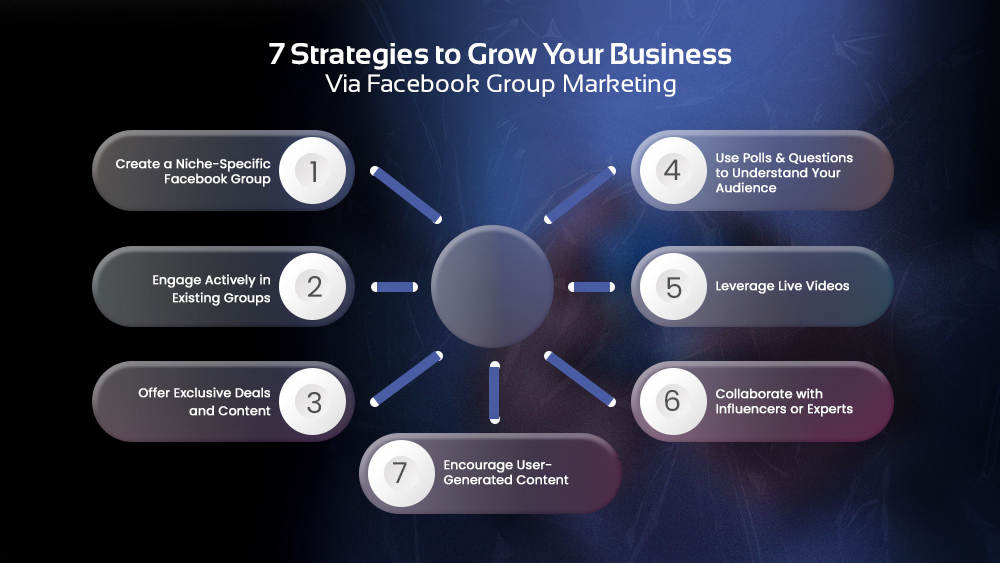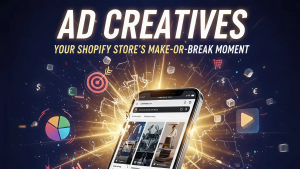Facebook Groups have become a powerful platform for businesses to connect with their audience personally. Unlike Facebook Pages, which focus on brand presence, Groups are more about community and conversation. Using Facebook group marketing effectively can significantly contribute to business growth by developing customer loyalty, increasing brand awareness, and driving sales.
In this blog, we’ll explore 7 proven strategies to grow your business using Facebook Group marketing. We’ll also address a commonly asked question: Can we do paid marketing in Facebook groups?
7 Facebook Group Marketing Growth Strategies

1. Create a Niche-Specific Facebook Group
Creating your own Facebook Group allows you to control the conversation and customize it to your audience’s interests. Focus on a specific niche that aligns with your business. For example:
- If you sell fitness products, create a group for fitness enthusiasts where you share workout tips and product recommendations.
- If you’re in the travel business, form a group for travel lovers to discuss destinations and tips.
Tips for Success:
- Choose a compelling name for your group that clearly indicates its purpose.
- Write a clear and engaging description to attract the right audience.
- Share valuable content regularly, such as tips, industry insights, and user-generated content.
2. Engage Actively in Existing Groups
You don’t have to create your own group to grow your business. Joining existing Facebook Groups related to your industry can also be beneficial. Look for groups where your target audience is active and engage meaningfully.
What to Do:
- Share helpful advice without being overly promotional.
- Answer questions and establish yourself as an expert in your field.
- Build relationships by interacting with members and their posts.
Pro Tip: Avoid spamming or hard-selling your products. Instead, focus on building trust.
3. Offer Exclusive Deals and Content
People love feeling special, and offering exclusive content or deals to group members can create loyalty. Use facebook group marketing to provide discounts, early access to products, or valuable resources.
Examples:
- Share free e-books, webinars, or templates.
- Announce new products to group members before the general public.
- Run group-only contests or giveaways.
This not only keeps your group members engaged but also motivates others to join.
4. Use Polls and Questions to Understand Your Audience
Understanding your audience is key to providing value. Facebook Groups make it easy to conduct polls or ask questions to gather insights.
How to Use This Strategy:
- Ask members what problems they’re facing related to your industry.
- Use polls to find out which products or services they’d like you to offer next.
- Encourage open discussions to generate new ideas and understand their preferences.
The insights you gain can help you improve your products and services, ensuring they meet your audience’s needs.
5. Leverage Live Videos
Live videos are a fantastic way to connect with your audience on a deeper level. Facebook group marketing allows you to host live sessions exclusively for members, making them feel part of a special community.
Ideas for Live Sessions:
- Host Q&A sessions to answer audience questions.
- Demonstrate how to use your products or services.
- Share behind-the-scenes content, like how your products are made.
Live videos build trust and create a sense of closeness with your audience, making them more likely to become loyal customers.
6. Collaborate with Influencers or Experts
Partnering with influencers or industry experts can help you attract new members and establish credibility in your Facebook Group.
How to Do It:
- Invite influencers to co-host live sessions or post in your group.
- Share expert tips or insights in collaboration with them.
- Run challenges or campaigns where influencers participate and promote your group.
Collaborations can bring in a fresh audience and add value to your group.
7. Encourage User-Generated Content (UGC)
One of the best ways to create engagement in your Facebook Group is by encouraging members to share their own content. User-generated content not only keeps the group active but also builds trust and credibility around your business.
How to Encourage UGC:
- Ask for Stories: Invite members to share how they’ve used your products or services.
- Create Challenges: Launch fun challenges, like asking members to post pictures or videos related to your niche.
- Highlight Member Contributions: Feature the best posts or comments from group members, making them feel valued.
By involving your audience in creating content, you strengthen your community and boost organic engagement.
Can We Do Paid Marketing in Facebook Groups?
This is a common question, and the answer is yes, but with limitations. Facebook doesn’t allow direct paid ads inside Groups, but you can use other methods to leverage paid marketing:
Strategies for Paid Marketing Around Groups:
- Boost Posts on Your Facebook Page: Create posts promoting your Facebook Group on your page and use Facebook Ads to boost them.
- Run Targeted Ads: Direct traffic to your group by running ads aimed at people interested in your niche.
- Collaborate with Group Admins: If you want to market in someone else’s group, reach out to the admins. Some may allow sponsored posts for a fee, but make sure this aligns with the group’s rules.
Important Reminder: Always follow Facebook’s advertising policies and respect group rules to avoid being removed or flagged.
Should You Make Your Facebook Group Private or Public?
One key decision when creating a Facebook Group is whether to make it private or public. Both options have their benefits, depending on your goals.
Private Groups:
- Members need approval to join, which creates exclusivity.
- Ideal for niche communities or groups offering premium content.
- Encourages more open and personal discussions, as posts are visible only to members.
Public Groups:
- Open to everyone, making it easier to grow quickly.
- Posts are visible to non-members, increasing visibility for your brand.
- Great for generating buzz and driving traffic to your website or products.
Pro Tip: Start with a private group if your goal is to build a loyal community, and consider switching to public if you want broader reach over time.
How Much Time Should You Dedicate to Managing a Facebook Group?
Managing a Facebook Group can be time-intensive, especially if you want it to thrive. It’s important to balance your efforts to ensure maximum impact without burning out.
Recommended Time Investment:
- Initial Setup: Dedicate 5–10 hours to set up the group, including branding, posting rules, and the first batch of content.
- Daily Engagement: Spend 15–30 minutes answering questions, approving posts, and interacting with members.
- Content Planning: Set aside 2–3 hours per week to schedule posts, host live sessions, and analyze performance.
Outsourcing Options:
If time is limited, consider assigning a team member or hiring a community manager to help with daily activities. This ensures your group stays active and engaging without overwhelming you.
By managing your time effectively, you can grow a thriving community while focusing on other aspects of your business.
Final Thoughts
Facebook Groups are a powerful tool for businesses looking to grow and connect with their audience. Whether you’re creating your own group or participating in existing ones, the key is to focus on delivering value and building relationships. With consistent efforts and the strategies outlined above, you can turn your Facebook Group marketing efforts into a major growth channel for your business.
By answering the question Can we do paid marketing in Facebook groups?, we’ve also highlighted how you can use paid strategies to complement organic efforts. Start experimenting with these tips today, and watch your business thrive!







